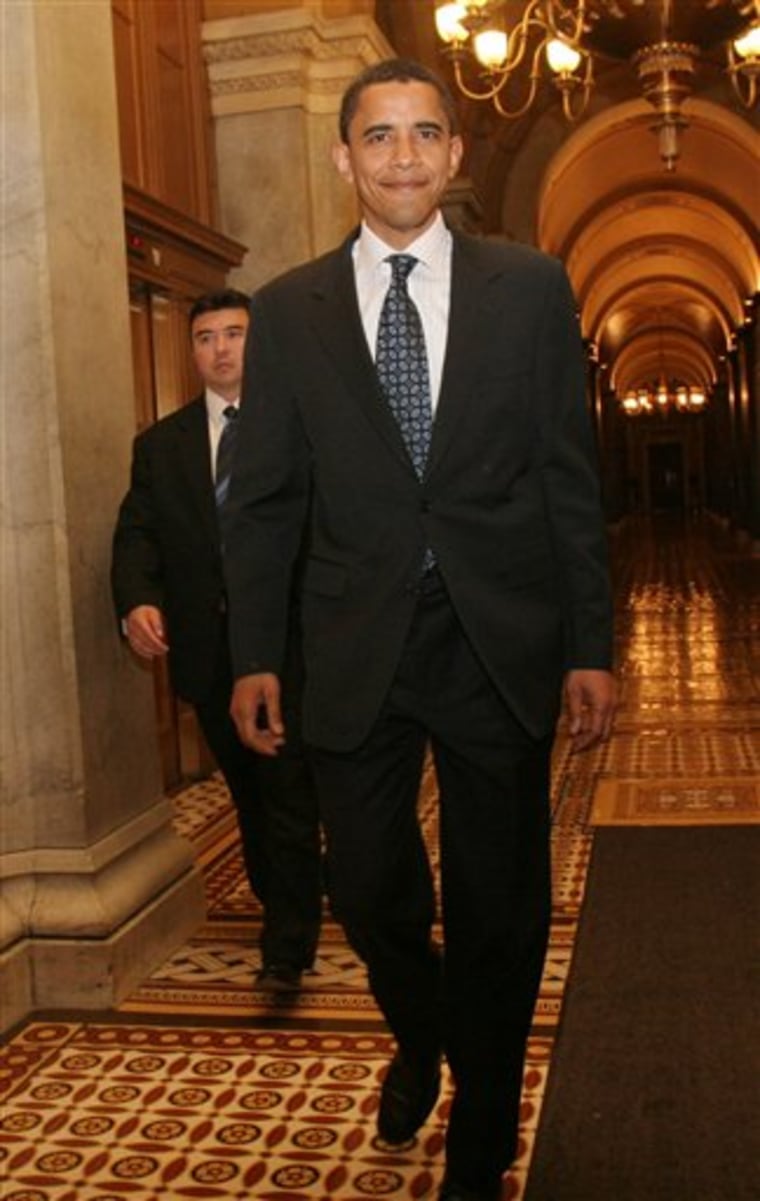Courting the anti-war constituency, Democratic presidential rivals Hillary Rodham Clinton and Barack Obama both voted against legislation that pays for the Iraq war but lacks a timeline for troop withdrawal.
"I fully support our troops" but the measure "fails to compel the president to give our troops a new strategy in Iraq," said Clinton, a New York senator.
"Enough is enough," Obama, an Illinois senator, declared, adding that President Bush should not get "a blank check to continue down this same, disastrous path."
Their votes Thursday night continued a shift in position for the two presidential hopefuls, both of whom began the year shunning a deadline for a troop withdrawal.
On a vote of 80-14, the Senate cleared the measure and sent it to Bush.
Both Clinton and Obama have faced intense pressure from the party's liberal wing and Democratic presidential challengers who urged opposition to the measure because it doesn't include a timeline to pull forces out of Iraq.
Other Senate candidates
Sen. Christopher Dodd of Connecticut, who also voted against the legislation, was among the Democratic candidates calling for rejection of it, along with former Sen. John Edwards of North Carolina and New Mexico Gov. Bill Richardson.
Of the four Democratic hopefuls in the Senate, only Sen. Joe Biden of Delaware supported the bill. He said he did so reluctantly because he viewed the measure as flawed. But he added: "As long as we have troops on the front lines, it is our shared responsibility to give them the equipment and protection they need."
With their "no" votes, Clinton, Obama and Dodd earned praise from the party's left flank, which has been pushing for a quick end to the war and is an important part of the Democratic base in the primaries.
"This bold stand by three of the four presidential candidates in the Senate won't soon be forgotten," promised Eli Pariser, executive director of MoveOn.org's political action committee.
Although they appeased the Democratic base, Clinton, Obama and Dodd did open themselves up to criticism from Republicans that they were denying 165,000 troops the resources they need - an argument that could be damaging in a general election.
Both Clinton and Obama had remained publicly uncommitted in the hours before the vote. Neither were on the Senate floor as voting began. Halfway through, Obama walked into the chamber and cast his "no" vote. Clinton did the same a few minutes later.
Why vote 'No'?
Obama framed the vote as a choice between "validating the same failed policy" and "demanding a new one."
"I am demanding a new one," he said. "We must fund our troops. But we owe them something more," Obama said, calling for "a clear, prudent plan to relieve them of the burden of policing someone else's civil war."
Clinton put the blame on Bush, saying that he should have "followed the will of the people" and signed an earlier bill that would have both funded the war and started a troop withdrawal.
"But the president vetoed Congress's new strategy and so Congress must reject the president's failed policies," she said, adding that Bush should begin a phased withdrawal and "abandon this escalation."
Clinton voted to authorize the invasion in 2002. She has since become a constant critic of the Bush administration's handling of it but has refused to call her initial vote a mistake. She had adamantly opposed setting a hard deadline for troop withdrawals, but a week ago she voted to advance a bill that would cut off money to force a troop withdrawal by March 2008.
Obama wasn't in the Senate in 2002. But he, like Clinton, prominently shunned earlier proposals to set a fixed timetable for an end to the war only to vote to advance last week's bill that included a date to bring home troops.
The voting went as expected in the GOP field.
Sen. John McCain, a staunch supporter of the troop increase and the war itself but a longtime critic of the way Bush waged it, is the only top-tier Republican candidate in Congress, and he voted for the measure. A lesser-known GOP hopeful, Sen. Sam Brownback of Kansas, did not vote.
In the House, long-shot Reps. Duncan Hunter, R-Calif., and Tom Tancredo, R-Colo., supported the bill, while Rep. Ron Paul, R-Texas, and Rep. Dennis Kucinich, D-Ohio, opposed it.
